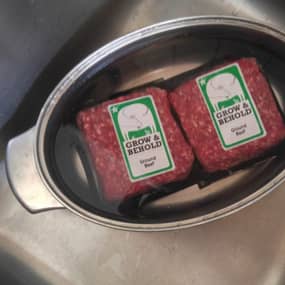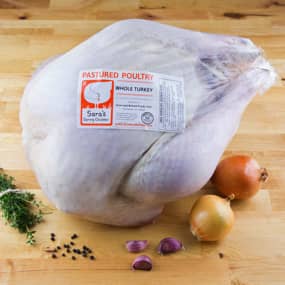How to Safely Thaw Meat, Poultry, Fish & Cheese
The Best Way: In the Fridge
The safest way to defrost meat, poultry and fish is in the refrigerator. Always place packages on a plate or in a bowl when defrosting. Allow about 24 hours per 5lbs of product. For a large turkey or brisket, this could mean a few days. You can put your turkey in the fridge up to 1 week before the day you plan to cook it; make sure it is on newspaper or a large plate in case of condensation.
The slow defrost in the fridge is recommended for thawing fish and cheese; a faster defrost in water can cause changes in the composition and texture of the product which are less desirable.
The Fastest Way: In Cold Water
Speedier defrosting of red meat and poultry can be achieved by submersion in COLD water. Make sure the meat is in a sealed, leak-proof container or bag, and change the water every 30 minutes or so. Small packages of meat or poultry weighing a pound or less may defrost in an hour or less. Allow about 30 minutes per pound (that is, a 10lb turkey would take about 5 hours to defrost this way.) If you are in a hurry, resist the temptation to thaw your meat using warm water. Meat that is left above 40F is in the danger zone for the proliferation of harmful bacteria.

Last minute dinner? Defrost in cold water for speedier results
How long can I keep thawed items in the refrigerator?
Here are our guidelines for how long you can store defrosted meat, poultry, fish and cheese, once you have thawed them in the fridge:
- Ground Meat and Poultry: 1-2 days
- Whole and Cut-up Poultry: 1-2 days
- Beef, Lamb, and Rose Veal: 3-5 days
- Deli Meats and Sausages: up to 2 weeks, if unopened; 3-5 days after opening
- Salmon: 1-2 days
- Gefilte Fish: 3-5 days
- Cheese: 3-4 weeks, if unopened; 1-2 weeks after opening

Unopened provisions can be stored in the fridge for a couple weeks.
Is it safe to refreeze meats after they have thawed?
As long as meat is cold to the touch, it is safe to refreeze without cooking. As the USDA notes, “freshness and quality at the time of freezing affect the condition of frozen foods. If frozen at peak quality, thawed foods emerge tasting better than foods frozen near the end of their useful life." That is to say, unlike frozen foods purchased from supermarkets or butcher shops, which may have been on the shelf for weeks before freezing, our products are frozen at peak quality, and will be ready to enjoy when you defrost and prepare them. So -- if you defrosted more than you need, or your meat arrives thawed, it can be refrozen with no loss of quality.

Need to cook only half a brisket? Defrost it partially so that you can cut it safely. Wrap the unused portion tightly and refreeze.
How long can frozen meat be stored in the freezer?
Our products are frozen at peak quality to ensure you enjoy the highest quality in thick, freezer-grade plastic, to ensure that your products will be delicious when you are ready to enjoy them. Packages with intact seals can be stored indefinitely; for best results, we recommend you use frozen meats within 6-12 months. The best place to store meat for extended time periods is in a deep freezer, or towards the back of an upright freezer. Avoid storing packages on the door of the freezer.
Occasionally, due to very quick turnaround between when the meats arrive at our freezing and distribution facility and when they are delivered to you, meats may be shipped fresh. Meat that is cold to the touch can be refrigerated for immediate use, or frozen for later use.

Chefs have told us they prefer our frozen meat to fresh meat from elsewhere
